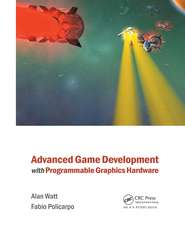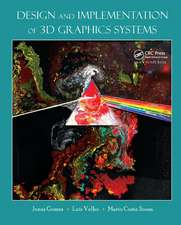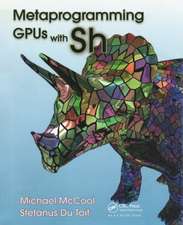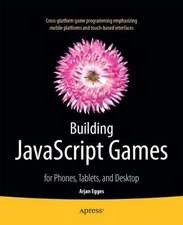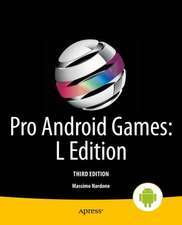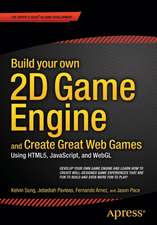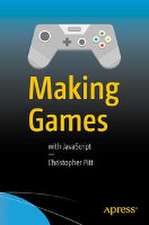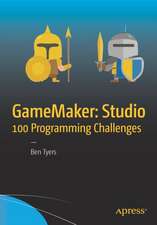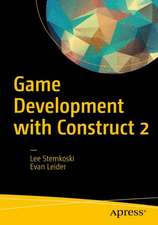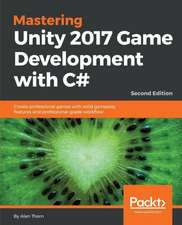The Gamer's Brain: How Neuroscience and UX Can Impact Video Game Design
Autor Celia Hodenten Limba Engleză Hardback – 17 aug 2017
The game UX accounts for the whole experience players have with a video game, from first hearing about it to navigating menus and progressing in the game. UX as a discipline offers guidelines to assist developers in creating the optimal experience they want to deliver, including shipping higher quality games (whether indie, triple-A or "serious" games) and meeting business goals -- all while staying true to design vision and artistic intent.
At its core, UX is about understanding the gamer’s brain: understanding human capabilities and limitations to anticipate how a game will be perceived, the emotions it will elicit, how players will interact with it, and how engaging the experience will be. This book is designed to equip readers of all levels, from student to professional, with cognitive science knowledge and user experience guidelines and methodologies. These insights will help readers identify the ingredients for successful and engaging video games, empowering them to develop their own unique game recipe more efficiently, while providing a better experience for their audience.
"The Gamer's Brain: How Neuroscience and UX Can Impact Video Game Design"
Is written by Celia Hodent -- a UX expert with a PhD in psychology who has been working in the entertainment industry for over 10 years, including at prominent companies such as Epic Games (Fortnite), Ubisoft, and LucasArts.
Major themes explored in this book:
- Provides an overview of how the brain learns and processes information by distilling research findings from cognitive science and psychology research in a very accessible way. Topics covered include: "neuromyths", perception, memory, attention, motivation, emotion, and learning.
- Includes numerous examples from released games of how scientific knowledge translates into game design, and how to use a UX framework in game development.
- Describes how UX can guide developers to improve the usability and the level of engagement a game provides to its target audience by using cognitive psychology knowledge, implementing human-computer interaction principles, and applying the scientific method (user research).
- Provides a practical definition of UX specifically applied to games, with a unique framework. Defines the most relevant pillars for good usability (ease of use) and good "engage-ability" (the ability of the game to be fun and engaging), translated into a practical checklist.
- Covers design thinking, game user research, game analytics, and UX strategy at both a project and studio level.
- This book is a practical tool that any professional game developer or student can use right away and includes the most complete overview of UX in games existing today.
| Toate formatele și edițiile | Preț | Express |
|---|---|---|
| Paperback (1) | 325.01 lei 3-5 săpt. | +20.04 lei 6-12 zile |
| CRC Press – 14 aug 2017 | 325.01 lei 3-5 săpt. | +20.04 lei 6-12 zile |
| Hardback (1) | 823.63 lei 6-8 săpt. | |
| CRC Press – 17 aug 2017 | 823.63 lei 6-8 săpt. |
Preț: 823.63 lei
Preț vechi: 1029.60 lei
-20% Nou
Puncte Express: 1235
Preț estimativ în valută:
157.61€ • 162.84$ • 131.11£
157.61€ • 162.84$ • 131.11£
Carte tipărită la comandă
Livrare economică 20 martie-03 aprilie
Preluare comenzi: 021 569.72.76
Specificații
ISBN-13: 9781138089969
ISBN-10: 1138089966
Pagini: 272
Ilustrații: 49
Dimensiuni: 156 x 234 x 21 mm
Greutate: 0.66 kg
Ediția:1
Editura: CRC Press
Colecția CRC Press
ISBN-10: 1138089966
Pagini: 272
Ilustrații: 49
Dimensiuni: 156 x 234 x 21 mm
Greutate: 0.66 kg
Ediția:1
Editura: CRC Press
Colecția CRC Press
Cuprins
Introduction. Part I: Video Games and the Brain. How the Brain Learns in a Nutshell. Perception. Attention. Memory. Emotion. Motivation. Applying Learning Techniques in Games. Part II: A UX Framework for Video Games. History of UX. Usability. GameFlow. User Research. Analytics. UX Reporting. Conclusion. References. Glossary. Appendix: UX Checklist. Index.
Recenzii
"The beauty of this book is that it is two things at the same time:
"By blending up-to-date brain science with game-relevant UX design principles, this book doesn't just give great tips about how to make better games, it gives designers the mental tools to get better at thinking about games. Read this, and suddenly you'll know what you're talking about."
-Jesse Schell, Game Designer, author of The Art of Game Design
"This book is an invaluable asset for game developers, whether you work in game design, user experience, or programming. With a lucid overview of the current best knowledge from cognitive psychology, Hodent provides guidelines and approaches to improve the game experience for players that are based on actual science."
-Raph Koster, Game Designer, author of A Theory of Fun for Game Design
- 1. An amazingly complete introduction to psychology, using examples from video games to make the concepts clear and memorable.
- 2. An amazingly complete introduction to video game design, using psychology to help design more compelling games.
"By blending up-to-date brain science with game-relevant UX design principles, this book doesn't just give great tips about how to make better games, it gives designers the mental tools to get better at thinking about games. Read this, and suddenly you'll know what you're talking about."
-Jesse Schell, Game Designer, author of The Art of Game Design
"This book is an invaluable asset for game developers, whether you work in game design, user experience, or programming. With a lucid overview of the current best knowledge from cognitive psychology, Hodent provides guidelines and approaches to improve the game experience for players that are based on actual science."
-Raph Koster, Game Designer, author of A Theory of Fun for Game Design
Descriere
This book is designed to equip readers of all levels, from student to professional, with neuroscience knowledge and user experience guidelines and methodologies. This knowledge will help readers identify the ingredients for successful and engaging video games, while providing a better experience for their audience.


